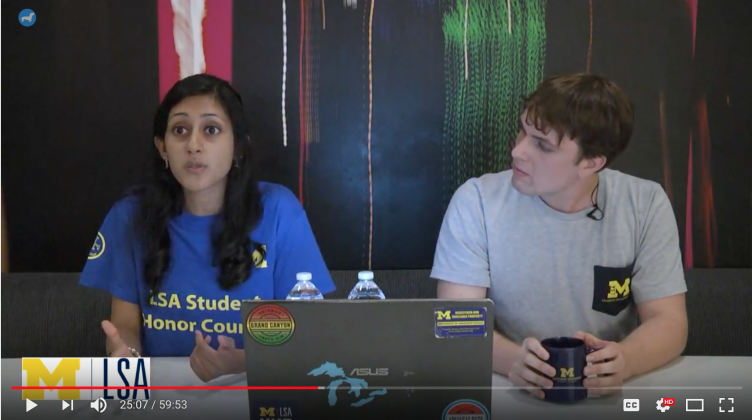
Students Khyati Somayaji and Nicholas Fadanelli participate in a Digital Wolverines “Ask Me Anything” session.
During the summer of 2017, in lieu of a more traditional “summer reads” program, the College of Literature, Science and the Arts launched an experiment in online, interactive, and collaborative explorations of citizenship and diversity in a digital age.
Because issues of free speech, safe spaces, inclusion, intellectual diversity, and identity-based marginalization continue to create divisions and challenges on campus, including its digital spaces, the LSA Summer Reads experience was designed to assist incoming first year students in discussing current issues on campus. The topics students engaged with the most were digital wellness; and free speech, hate speech, and provocation.
Through initial discussions, students began to build community by sharing digital survival tips and personal stories. Transfer students made connections with each other and another found a student from their high school. Several students wrote eloquently about provocation.
The content was designed to be interactive by nesting levels of engagement through the use of readings, videos, polls, and discussions, as well as “Ask Me Anything” (AMA) style live-video chats throughout the summer. Online, asynchronous, discussions began with video-based and graphically rich prompts, and included links to more material for students who wanted to “dig deeper.” Staff from the Language Resource Center (LRC) and Instructional Support Services (ISS) trained and worked with student employees in their respective units to facilitate the discussions, which were opened on a weekly basis and continued throughout the summer. The AMA sessions featured current students responding to thematic topics, were produced by LSA Instructional Support Services, and are now available to students who were unable to attend.
Canvas was chosen as an authenticated digital safe space, with the added benefit that it exposed incoming first year students to U-M’s course website tool.
Eighty-seven students self-enrolled in the project along with 267 Honors students, who participated as their own cohort. Numbers and participation followed the familiar online group behavior patterns with most enrolling in the first few weeks, and the pattern of posting dwindling as time went on.
The LSA Summer Reads Design Team included collaborations among the following units: LSA Dean’s Office, Student Academic Affairs, Student Life, Honors, Instructional Support Services, Language Resource Center, Academic Innovation, the University Library, the English Language Institute, Information Assurance, and U-M Social Media.
If you have any questions about the LSA Digital Wolverines Summer Reads experience, or wish to join the collaboration for this year, contact Phill Cameron (phillcam@umich.edu).
